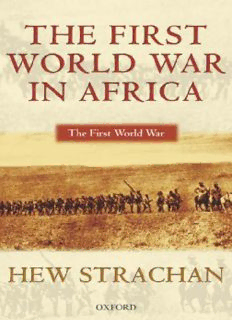
The First World War in Africa PDF
Preview The First World War in Africa
the first world war The First World War in Africa This page intentionally left blank THE FIRST WORLD WAR IN AFRICA HEW STRACHAN 1 3 GreatClarendonStreet,Oxfordox26dp OxfordUniversityPressisadepartmentoftheUniversityofOxford. ItfurtherstheUniversity’sobjectiveofexcellenceinresearch,scholarship, andeducationbypublishingworldwidein OxfordNewYork Auckland Bangkok BuenosAires CapeTown Chennai DaresSalaam Delhi HongKong Istanbul Karachi Kolkata KualaLumpur Madrid Melbourne MexicoCity Mumbai Nariobi Sa˜oPaulo Shanghai Taipei Tokyo Toronto OxfordisaregisteredtrademarkofOxfordUniversityPress intheUKandincertainothercountries PublishedintheUnitedStates byOxfordUniversityPressInc.,NewYork #HewStrachan2004 Themoralrightsoftheauthorhavebeenasserted DatabaserightOxfordUniversityPress(maker) Firstpublished2004 Allrightsreserved.Nopartofthispublicationmaybereproduced, storedinaretrievalsystem,ortransmitted,inanyformorbyanymeans, withoutthepriorpermissioninwritingofOxfordUniversityPress, orasexpresslypermittedbylaw,orundertermsagreedwiththeappropriate reprographicsrightsorganization.Enquiriesconcerningreproduction outsidethescopeoftheaboveshouldbesenttotheRightsDepartment, OxfordUniversityPress,attheaddressabove Youmustnotcirculatethisbookinanyotherbindingorcover andyoumustimposethissameconditiononanyacquirer BritishLibraryCataloguinginPublicationData Dataavailable LibraryofCongressCataloginginPublicationData Dataavailable ISBN0-19-925728-0 1 3 5 7 9 10 8 6 4 2 TypesetbyKolamInformationServicesPvt.Ltd,Pondicherry,India PrintedinGreatBritainonacid-freepaperby BiddlesLtd.,King’sLynn,Norfolk PREFACE TheFirstWorldWarhasnotalwaysgoneunderthattitle.Forthosewho endured it at the time and who spoke English it was the GreatWar. In France,‘laGrandeGuerre’stillenjoyswidecurrency.InGermany,how- ever, it was from the Wrst a world war, ‘Der Weltkrieg’. The use of the world‘Welt’didnotnecessarilycarryprecisegeographicsigniWcance.It wasasmuchanindicationofthewar’simportance,ofitslikelyimplica- tions for the future, and of the vast ideological and cultural baggage which accompanied it. Nonetheless, while recognising that point, we shouldnotdismisstheincorporationoftheworldinthewar’snameas mererhetoric.Alloftheoriginalbelligerentsin1914possessedterritories outsideEurope;theirdecisionstogotowarimmediatelyimplicatedtheir coloniesintheothercontinents.Britainwasmuchmore:itwasthehub oftheworld’sshipping,insurance,bankingandtradingnetworks.These werebothitsgreatestassetinwaranditsprincipalvulnerability. Germany committed its armed forces to the Wghting within Europe, butitalsorecognisedtheopportunitywhichtheircoloniespresentedto strike at its enemies outside Europe. The British empire was the soft underbelly of the Entente. Germany’s intention was what Britain in a later war would call a peripheral strategy, to target distant points to whosedefencetheenemywouldbecompelledtodivertbothforcesand resources. In 1914 Germany had two major means by which it could develop such schemes. One was its alliance with the Ottoman empire, concludedon2August1914,whichbroughttheTurksintothewaronthe side of the Central Powers at the end of October. Germany hoped to precipitate revolution among the Muslim peoples subject to British, French, and Russian rule. There were reckoned to be about 50 million MuslimsinAfricain1914.ThesummonstoHolyWar,proclaimedon14 November1914,washeardinNigeria,Uganda,theSudanandtheCongo; itwasrelayedasfarsouthasNyasaland.Butfewofthoselivingsouthof the Sahara responded. Even in North Africa the threat of revolt was, ultimately,contained.Thesewereterritorieswhichhadoncebeenunder Ottomanrule,andthecombinationoftemporalwithreligiousauthority vi preface whichtheSultaninConstantinopleclaimedthroughtheCaliphatemade thethreatthatmuchgreater.ThestoryofwhathappenedinEgyptand Libyatotheeast,andAlgeriaandMoroccotothewestiscontainedinthe Wrst volume of my history of the war, The First World War—To Arms. Thisbookfocusesonsub-SaharanAfrica. German success, or the lack of it, in North Africa depended on its Turkish allies. In the rest of the world its principal arm, at least at the war’soutbreakin1914, was thecruisersof theGerman navy.The naval build-up driven by Alfred von Tirpitz was directed at the balance of powerintheNorthSeaandfocusedonbattleships.Butthenavywasalso justiWedasaninstrumentofBernhardvonBu¨low’sWeltpolitik.Itthere- fore had global aspirations, which its base in China, established at Tsingtao in 1897, demonstrated. The ships which showed the Kaiser’s Xag in peacetime were potentially the scourge of Britain’s trade in wartime. The greatest constraint on their eVectiveness was their need forsupplies,ammunitionandcoal.Asteamshipwasfarlessindependent ofsupportfromthelandthanthesailingshiphadbeen:itcouldonlyeke outitsfuelovertwentydaysbykeepingitsspeeddownandinpracticeit mightneedtocoaleveryeightdaysorso.Inadditiontoitspossessionsin the PaciWc,Germany had colonies in east, west,and south-westAfrica. Each of them had harbours capable of equipping, victualling and bunkering warships. Duala, Swakopmund, and Lu¨deritz gave onto the Atlantic,TangaandDaresSalaamontotheIndianOcean.Britishtrade fromtheFarEastandIndia,passingroundtheCapeofGoodHopeor cutting north to the Suez canal was conveyed on routes close to these ports.ThestoryoftheGermancruisercampaignisalsotoldinTheFirst WorldWar—ToArms. Britain’saimatthebeginningoftheFirstWorldWarwasthereverseof Germany’s. Germany wanted to open the war up in order to divert BritaininparticularfromthewarinEurope.Britainwantedtocloseit down so that it could concentrate its eVorts in France and Belgium. GermanyhadanticipatedtheprobabilitythatintheeventofwarBritain would re-route the world’s principal under-water cable links through London,soastoenableBritishintelligencetomonitorsignalstraVic.It had therefore set about—and by1914 had all but completed—the con- struction of a series of transmitters whose range spanned most of the world.InAugust1914Britain’sattentionwasfocusedinEurope.There- preface vii fore,thetaskofitsforcesinAfricawasminimalandtightlydeWned.On5 August 1915 a sub-committee of the Committee of Imperial Defence statedthatBritain’sobjectivesoutsideEuropeweretodonomorethan secureitsmaritimecommunications.Itshoulddosobyusingonlylocal forces to gain control of German harbours and to destroy the German wireless network which would enable the coordination of Germany’s global strategy. Britain had no desire to add to the burdens of empire byacquiringfreshterritory. Britain’sstrategicaimsdidnot,however,standalone.First,theywere inXuencedbywhathistoriansnowcallsub-imperialism—theambitions notonlyofthoseonthespotbutalsoofthesemi-independentdomin- ions of those on the spot. As what follows makes clear, South Africa harboureddesignsinsouthernAfricatowhichBritainhadtopaycourt. TheAfrikanerpopulationhadfoughtabitterandprotractedwaragainst theBritishjustoveradecadebefore,andtherevoltbydie-hardBoersin 1914remindedLondonthatitcouldnottakeSouthAfrica’sloyaltyfor granted.TheSouthAfricanscould—anddid—doLondon’sworkforitin Africa,butindoingsowereabletosettheirownagenda. Secondly,theFrench,themselvesamajorAfricanpower,wereworried by the prospect of their longest-standing imperial rival conducting campaigns in territories where they too had designs, while they them- selves were perforce focusing their eyes and eVorts on metropolitan France. Their sensitivities were compounded by their identiWcation of west Africa in particular as a source of military manpower for deploy- ment in Europe. As a result, Britain used its acquisition of German territoryinAfricatoregulateitsrelationshipswithitsalliesandsupport- ers rather than to appease its own lust for empire. What followed can, with justice, be described as the last stage in the scramble for Africa. Moreover,unlikeitsWrststage—thecongressinBerlinin1885,thiswas about more than drawing lines on the map. Men on the ground were testing those maps against reality, taking the penetration of colonial powers further into the interior. They did so in pursuit less of empire thanoftheenemy,butthelocalconsequenceswerenotverydiVerent,the openingofroads,theassessmentoflocalresourcesandthedevelopment ofthecasheconomy. Muchofthatmoneywasdisbursedtopayformen,aswellasforfood. ThewarinAfricawasfoughtlargelybyAfricans.Itsscalemayhavebeen viii preface dwarfed in absolute terms by the events unfolding at the same time in Europe,butthewar’simportanceneedstobejudgedinitslocalcontext aswellasitsglobalone.TheFirstWorldWarranksalongsidetheslave tradeintermsofitsimpactonAfrica.Itsimpactwasfeltacrosstheentire continent,andthroughoutthewar’slengthoffourandmoreyears.The WghtingmayhavebeenconWnedtocertaintheatresbutitsneedsdrewon the economies of all the adjacent territories. The First World War re- moved men—and women and children—from their homes; it under- mined traditional patterns of authority; it destroyed many of the economic and especially agricultural beneWts which colonisation had brought;andinsomerarecasesittriggeredtheWrstdemandsforAfrican independence. The text of what follows remains largely as it was when it was Wrst publishedinTheFirstWorldWar—ToArms.Ihave,however,takenthe opportunitytocorrectmisprintsandIammostgratefultoN.C.Palmer inparticularforhiscarefulreadingofthetext.IhavemodiWedwhatIsaid onthehealthofGermansinEastAfricainthelightofRossAnderson’s work,itselfduetobepublishedin2004,andIammostgratefultoPeter YearwoodforputtingmerightonaspectsoftheCameroonscampaign. CONTENTS listofmaps x 1. Introduction 1 2. Togoland 13 3. TheCameroons 19 4. South-WestAfrica 61 5. EastAfrica1914–1915 93 6. EastAfrica1916–1918 131 furtherreading 185 bibliography 189 index 211
Description: